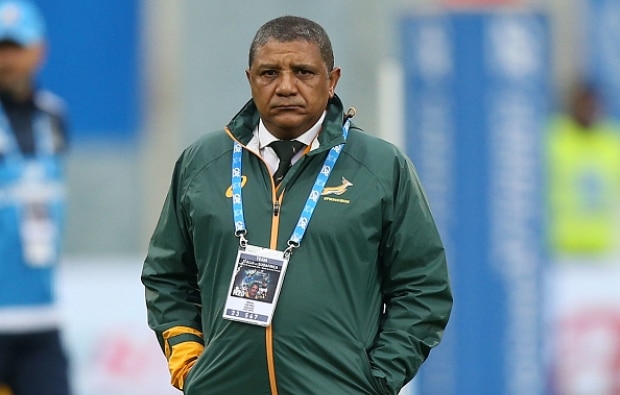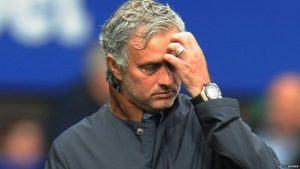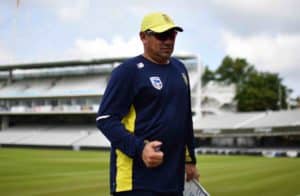SA Rugby’s decision to retain Allister Coetzee, as well its new overseas-player policy, will limit the Springboks’ progress in 2017, writes JON CARDINELLI.
This past week, the SA Rugby executive council reaffirmed its support for Allister Coetzee. This is the coach who presided over eight defeats in 12 Tests and is statistically the worst Springbok coach in the professional era.
What does this say about the state of SA Rugby when such mediocrity is rewarded? Surely someone needs to answer for the failure and humiliation in what was one of the darkest years in South African rugby history.
Unfortunately, the situation is more mad than bad. Indeed, when you look a little closer, you’re inclined to feel a bit sorry for Coetzee.
SA Rugby confirmed Coetzee’s appointment only two months before the Springboks’ first Test of the 2016 season. A year on, and it appears as if he is being set up to fail once more. If the Boks lose the three-Test series to France in June, Coetzee will be shown the door.
Coetzee and his coaching staff can’t be expected to make significant changes in the space of a few months. They met with an extended Bok training squad for the first time on Sunday. It’s fair to say that the team’s approach against France will be restricted by the fact that the coaches’ jobs are on the line.
To state the obvious, this is not a recipe for long-term success.
It begs the question why Coetzee wasn’t fired at the end of 2016 and why SA Rugby didn’t pursue alternative options more aggressively before the 2017 season commenced. The Boks are crying out for a coach to restore traditional South African strengths and awaken certain skills that have been dormant for too long.
Coetzee failed to bring balance to the South African rugby force over the course of the 2016 season. Why would anyone expect him to find the solution now, in the three months leading up to the do-or-die series against France?
This question leads to another question: Why do the powers that be continue to waste so much time?
SA Rugby appears bent on limiting the Boks’ progress. Coetzee has been shown to be out of his depth and cannot take the national side forward. Yet he’s been retained for at least another three Tests.
ALSO READ: Boks alter overseas-player policy
More recently, SA Rugby confirmed that overseas-based players would not be considered for national selection unless they had 30 or more Test caps. It’s a highly questionable move given how much value overseas-based players have added to the national cause in the professional era.
Speak to the great South African players of yesteryear, and they will tell you that their experiences at overseas clubs made them better Boks. The players returned to South Africa with a different perspectives on foreign players, coaches and the game itself.
What’s more, they shared this knowledge with their Bok teammates and coaches and ultimately improved the team’s performance. If anything, the drive to receive a higher education abroad should be encouraged.
SA Rugby may argue that its policy still allows for the selection of overseas players. What it won’t admit, is how this policy will limit the Boks’ progress in the short term.
Coetzee said it himself in the wake of the 57-15 defeat to the All Blacks last year: South African rugby does not have the players to compete with the best. He felt that the development and retention of players required urgent attention, and planned to address the issue at the first coaching indaba held in October.
That said, it’s hard to get around the fact that there are better opportunities overseas, and that the best players will continue to play abroad. The money is attractive, but so too is the prospect of playing alongside Test stars from around the world and in tournaments that are recognised as the toughest on the planet. Why would a South African player choose to stay in a local team that is never going to win a trophy in a Super Rugby tournament that has become largely irrelevant?
SA Rugby hopes to limit the exodus of South Africans with its new overseas-player policy. It hopes to convince school-leavers to stick around and to keep younger Bok players in South Africa for three to five years.
The sad truth is that South African rugby cannot offer every elite player an incentive to remain in the country. Europe offers the chance to earn a life-changing amount of money, as well as a career-boosting opportunity to develop one’s game. Until SA Rugby gets its house in order, the powers that be cannot really expect the best youngsters to stay put in South Africa.
Perhaps this is why SA Rugby has left the back door open for overseas-based players who don’t meet the 30-cap requirement. While these players are ineligible for regular Test matches, they may be selected in a World Cup year. The idea is that the coach will travel to the global tournament with the strongest possible team and the best chance of performing.
SA Rugby wants to reward young players for remaining in South Africa, but this new policy appears geared towards the opposite. When overseas-based players parachute into the Bok camp on the eve of the World Cup tournament, they may replace those who have formed part of the team in the preceding three years. And when that happens, those local players might wonder why they ever decided to remain in South Africa.
Bringing in a host of overseas-based ringers will be necessary, but may compromise the synergy and harmony of the group. Championship-winning teams are built over years, not months. It’s for this reason that overseas-based players who are considered crucial to the cause must be involved from day one, regardless of their Test cap-count.
Photo: Gabriele Maltinti/Getty Images





